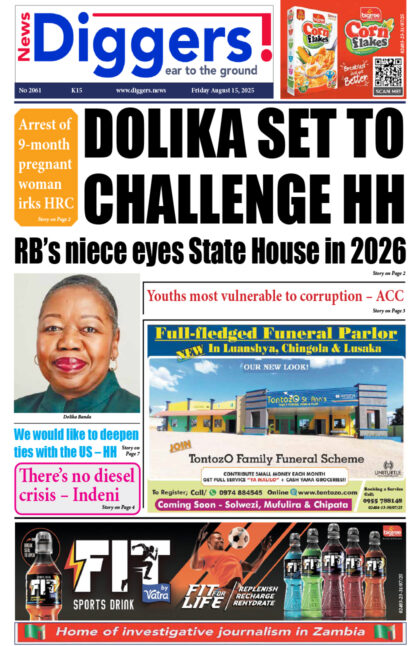Economist Professor Oliver Saasa has insisted that government should do everything possible to clinch a deal with the International Monetary Fund (IMF) so that the country can have some goodwill which could go a long way in reviving the economy.
And Prof Saasa says government should be more open to dialogue with the mines in 2020 as they have shown willingness to make some compromises.
In an interview, Prof Saasa noted that some of government’s actions were contrary to its affirmation that it was serious about getting an IMF package.
Meanwhile, Prof Saasa, Premier Consult managing consultant, noted the importance of getting an IMF program in the year 2020.
“The first for me, I think let’s strive to get to the IMF. I am aware that the honorable Minister of Finance Dr Bwalya Ng’andu is committed to this and by extension, government is committed to this, that has been announced. Of course you hear indications that suggest that perhaps we are not doing it very well, probably sometimes angrily, especially when it comes to our international relations with some major countries that have influence on whether or not we can get the debt, you know who. But the most important thing is that we need is a program that allows the country to be perceived in a slightly better light than is currently the case. What I mean here is that investors usually have a tendency to gravitate towards countries that have a program with the IMF when they are in a condition where we are now,” Prof Saasa said.
“So will the IMF will give us money, and I’d love that we can access that money, and we should strive to get that money, the goodwill of the international community, especially the investors, portfolio investors and foreign direct investment would be positive. The credit rating, because there is this assurance that something is happening along the lines of this recession of the global economy, it’s like an assurance that you have been inoculated against a problem that was perceived to be associated with your behavior. So when there is a doctor hovering around, people become a little bit more comfortable that a cure is around the corner and that is really where we have to look at. We should look at getting a program with the IMF, not so much with the quantum of the resources that will be provided by that multilateral institution but the goodwill, the international financing institutions, investors that will come with that decision and for me that is really one thing that we must really strive for.”
And Prof Saasa highlighted the importance of dialogue between government and mining companies.
“One sector that is so strategic, definitely is dominated presently by foreign investors, the mining sector. If you listen carefully to what the mining sector and the offers that they are putting out in terms of trying to show goodwill like ‘okay, we are demanding this especially to the extent that it affects our activity but we can let go of this’, they have actually even offered to tinker around in terms of renegotiating the repayment methods and duration of Vat refunds, I am aware of that. I think we better start listening more in terms of these things. Now to do that, I recommend very strongly and I think I have said this before, we have to develop a dialogue mechanism that allows us to meet more frequently than has been the case, listening to each other attentively, we may not like the messages from either side but it’s only through dialogue that this strategic relationship that’s so important especially in terms of export receipt, that is so important in terms of the value of the kwacha because 70 per cent of our dollar comes from the mines. So far, we have not done so we in terms of talking in 2019 and 2018, I am hoping that doors of dialogue will be opened at that level,” he said.
Meanwhile, Prof Saasa asked government to stop politicizing the cries of the private sector.
“The private sector when you hear them crying , don’t be political about it. And I have seen that sometimes our colleagues in government don’t realize that the people that are crying are not foreigners, many times they are Zambians but when the private sector are crying, for government to listen to them, it’s not like they don’t like government, it’s like the lead driver but most importantly, their survival defines whether the economy grows because the engine of growth is in production and production is handled by the private sector. So the dialogue between government and the private sector, starting to listen to each other a little bit better than has been the case so far is my prayer for 2020,” said Prof Saasa.
“Now, that is really at the macro level because we really want to sanitize the otherwise not very rosy picture of Zambia at the moment if you look at the macro-economic fundamentals but I think the most important thing is internal, how do we manage the limited resources that we have? Where do we put them, how much or where we put them are yielding or anticipate sufficient returns on those investments to be able to soldier on. It speaks to the prioritization of where we want to invest. Roads sector is one I can single out. This one is very important and we must continue but we must moderate because that is one sector that though very important, the speed at which we want to see our roads look beautiful must be aligned with our capacity to service the resources if they are picked from outside the country, how we are able to meet the obligations of those loans. There are other sectors because you see, when you talk about stabilizing the economy, stabilizing the currency, stabilizing the foreign exchange, or stabilizing interest rates, it’s all about production, it’s the private sector.”
























